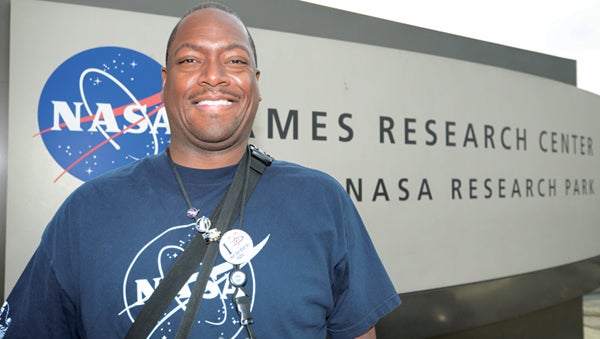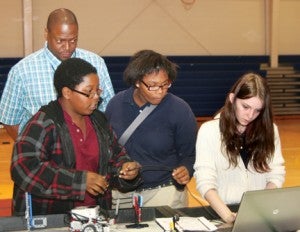Shoot for the Stars
Published 9:53 am Tuesday, May 12, 2015

Bertie Middle School STEM instructor Darrell Walker poses outside the NASA Research Center in California. This summer Walker will be the only North Carolina educator participating in a space-science workshop in Houston, Texas. Contributed Photo
WINDSOR – Darrell Walker has achieved lift-off.
The Bertie Middle School STEM (Science, Technology, Engineering, and Math) instructor has been selected for Lift-Off 2015, a weeklong professional development training workshop for teachers which emphasizes STEM learning experiences by incorporating a space science theme supported by NASA (National Aeronautic and Space Administration) space missions.
Teacher participants are provided with information and experiences through speakers, hands-on activities and field investigations that promote space science and enrichment activities for themselves and others.
Highlights of the Texas-based workshop slated for June 28-July 3 include presentations by NASA scientists and engineers; tours of NASA and the Johnson Space Center in Houston; hands-on, inquiry-based classroom activities aligned to educational standards; career exploration; “Teacher Feature” (sharing of classroom lessons and activities); and an opportunity to interact with researchers dedicated to space missions.

Darrell Walker carefully studies his Bertie Middle School STEM students during a practice for last winter’s Robotics competition held at Roanoke-Chowan Community College. Staff Photo by Gene Motley
Walker, an Elizabeth City native and graduate of Elizabeth City State University who is in his first year as an instructor at BMS, applied for the workshop at the deadline in early April and was mildly surprised at his selection.
“It’s an opportunity to receive cutting-edge information in the world of STEM in the eyes of scientists, engineers, and astronauts,” Walker details in his Windsor classroom. “It’s a thrill for me because I have never met an astronaut.”
Highlighting the 2015 LiftOff program will be a presentation by Astronaut Don Pettit. Pettit, originally a chemical engineer, is passionate about education and has conducted numerous science activities during his two trips onboard the International Space Station (ISS). Pettit will talk to the educators about life in microgravity and the science accomplished in this unique environment. The space station is a unique spacecraft in low-Earth orbit. It is the largest and longest inhabited object ever to orbit the Earth and has maintained a permanent human presence aboard it since 2000. The ISS is an amazing feat of technology that allows humans to explore, live in, and perform science in space.
Like many who see the lure of space exploration beyond video games and “Star Wars” and other science-fiction films, Walker has been fascinated with life beyond earth’s gravity.
“I knew that one of the qualifications to be an astronaut is that you cannot be taller than 6’3”, and I’m 6’6”,” he jokes. “And I think a lot of that has to do with the design of the space-ships.”
Walker says he’s very fortunate to be one of the lucky educators chosen because of the exclusivity and selectivity of this group.
“I’m very excited,” he enthuses. “I have a friend in the Texas area (Texas participants, if selected, have all their expenses paid by the Texas Space Grant Consortium), and she was rejected, so to actually be a teacher from North Carolina and be accepted just makes things that much more worthwhile.”
Walker says he participates in several workshops each summer, even making presentations at a few of them around the country, hoping the exchange will benefit his classroom environment once the school year begins.
“I felt this could be an opportunity I could partake in for the summer,” he explained. “This allows me to keep my skills sharp, and to be around others who live and breathe STEM.”
Walker helped his BMS colleagues prepare the Phoenix team for the inaugural LEGO-Must Innov8 Roanoke River Valley Education Consortium Robotics Pilot Project Ultineers Tournament at Roanoke-Chowan Community College at the end of March and days later was online applying for the LiftOff Summer Institute.
“I made an inquiry about the program,” he said. “I sent an e-mail introducing myself and they got back with me suggesting I apply. They also contacted my state’s grant for financial support ($650 registration fee, plus travel to Houston) and then I got notification April 14 in a congratulatory e-mail.”
In October, Walker participated in a NASA social media event at the NASA Ames Research Center in Mountain View, California.
“They usually host these around any happenings with NASA such as a rocket launch,” Walker maintains. “I had made a presentation at the National Science Teachers Conference in Richmond. I made the presentation that morning in Virginia and flew that same day to the Bay area, so there was a lot going on.”
Walker’s visit coincided with the 75th anniversary of the opening of the NASA Center in Ames and allowed him a behind the scenes look at how the center works with innovations like the world’s largest wind tunnel.
“This was an experience I could use toward LiftOff because of my prior experience which was good on my application,” he related. “They like go-getters who operate out of their individual comfort zone; those who face their fears in order to learn – they find that essential.”
Walker says Liftoff will provide modules that he can bring back and share with his students next year.
“These will be various activities that they share with us so we can then use these as lessons for the students,” he said. “They want to train teachers to also cross-train with other educators.”
“When you talk about space, you’re talking about everything from the Earth ground up until it touches outer-space,” he concedes. “I want to make sure I touch on standards in science and math that the students need to know to be successful in the classroom. Getting them to get a grasp of all the dimensions is important.”
Despite his primary area being rural, distant and underserved as some consider the northeast corner of the state, he thinks career dialogue is important.
“I won’t just be telling them they should do this or that,” he emphasizes. “I hope I’m actually modeling for them through these programs to take risks and chances. Don’t just talk about space, take this information and become the new ambassadors for NASA and other agencies.”
If Walker accomplishes even a portion of that, he might have just crossed “the Final Frontier”.

